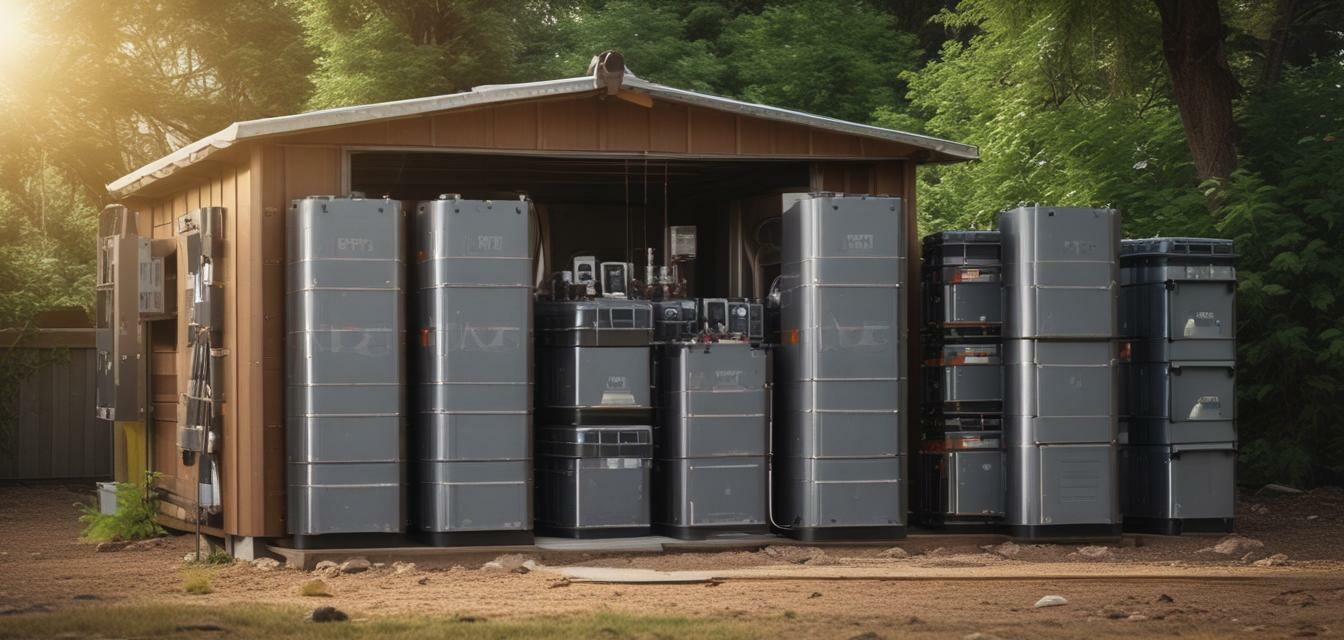
Best Practices for Maintaining Your Off-Grid Battery System
Key Takeaways
- Regular maintenance is essential for maximizing battery lifespan.
- Understanding the specific requirements of your battery type is crucial.
- Use monitoring systems to track battery health and performance.
- Environmental factors can impact the efficiency of your battery system.
- Investing in proper storage solutions can enhance battery longevity.
With the increasing popularity of solar energy and the need for power independence, many people are turning to off-grid battery systems. These systems store energy generated from solar panels or wind turbines, allowing you to use electricity even when the sun isn't shining, or the wind isn't blowing. However, to ensure optimal performance and longevity of your battery system, regular maintenance and attention to best practices are key. In this guide, we will explore essential tips for maintaining your off-grid battery system.
Understanding Battery Types
Before diving into maintenance, it's important to understand the different types of batteries available for off-grid systems:
| Battery Type | Pros | Cons |
|---|---|---|
| Lithium-ion | Long lifespan, fast charging, lightweight | Higher initial cost |
| Lead-acid | Lower cost, widely available | Shorter lifespan, heavier |
| Gel | Safe, maintenance-free | Less efficient at high temperatures |
| AGM | Good discharge rates, reliable | Can be expensive |
Routine Maintenance Practices
Regardless of the battery type, certain routine maintenance practices apply:
1. Regular Inspections
Check your battery system at least once a month. Look for any signs of corrosion, damage, or wear. Make sure all connections are tight and secure.
2. Cleanliness is Key
Keep the battery terminals and surrounding areas clean. Dirt and buildup can lead to poor performance.
3. Ensure Proper Ventilation
Place your battery system in a well-ventilated area to prevent overheating. This is especially important for lead-acid batteries, which emit gases.
4. Check Electrolyte Levels (for Lead-Acid Batteries)
If you are using flooded lead-acid batteries, check the electrolyte levels regularly and top up with distilled water as needed.
5. Monitor Battery Performance
Use battery monitors to keep track of charge levels, voltage, and overall health. This helps in detecting potential issues early.
Environmental Considerations
The efficiency of your off-grid battery system can be affected by environmental factors such as temperature and humidity:
- Temperature: Extreme heat can shorten battery life, while excessive cold can affect performance. Aim to keep your batteries in a stable climate.
- Humidity: Keep the area around the batteries dry to avoid moisture buildup, which can lead to corrosion and other issues.
Storage Solutions for Longevity
Proper storage of your battery system can significantly influence its lifespan. Below are some practices to consider:
Tips for Beginners
- Invest in high-quality battery cases or enclosures that provide protection from the elements.
- Keep your batteries away from direct sunlight and extreme environmental conditions.
- Consider installing a dedicated battery disconnect switch to prevent accidental discharges.
Advanced Practices for Battery Maintenance
If you're looking to take your battery care to the next level, consider these advanced practices:
1. Equalization Charging
This process ensures all cells in a battery bank are equally charged. It prevents sulfation and extends battery life, particularly for lead-acid batteries. Regular intervals for equalization are advisable.
2. Use Solar Charge Controllers
Invest in a high-quality solar charge controller to prevent overcharging and deep discharging of your batteries. This equipment regulates the voltage and current from your solar panels.
3. Record Keeping
Maintain logs of all maintenance activities and battery performance readings. Historical data can help identify patterns and issues over time, aiding in more strategic maintenance efforts.
Conclusion
Maintaining your off-grid battery system doesn't have to be a daunting task. By following these best practices, you can ensure the longevity and efficiency of your energy storage solution. Remember, a well-maintained battery system not only saves you money in the long run but also ensures your independence from the grid.
Further Reading
If you're interested in expanding your knowledge on solar energy solutions, check out some of our other guides:
- Buying Guides for Solar Systems
- Latest News and Trends in Solar Energy
- DIY Projects for Off-Grid Living
Pros
- Proper maintenance extends the lifespan of your battery system.
- Maintained batteries perform better and provide more reliable power.
- Knowledge of your system leads to informed decision-making.
Cons
- Time commitment required for routine maintenance.
- Initial investment in monitoring systems may be high.


